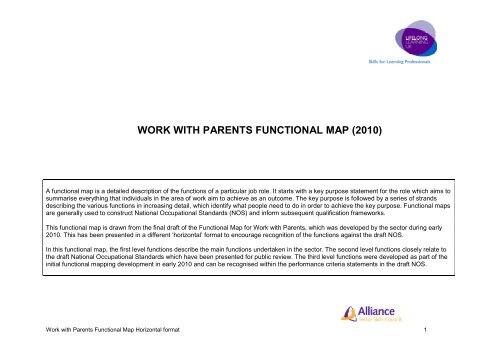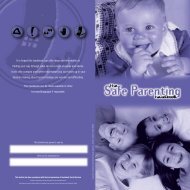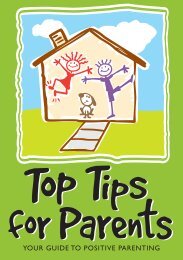Download the Work With Parents Functional Map (2010) - Children in ...
Download the Work With Parents Functional Map (2010) - Children in ...
Download the Work With Parents Functional Map (2010) - Children in ...
Create successful ePaper yourself
Turn your PDF publications into a flip-book with our unique Google optimized e-Paper software.
WORK WITH PARENTS FUNCTIONAL MAP (<strong>2010</strong>)<br />
A functional map is a detailed description of <strong>the</strong> functions of a particular job role. It starts with a key purpose statement for <strong>the</strong> role which aims to<br />
summarise everyth<strong>in</strong>g that <strong>in</strong>dividuals <strong>in</strong> <strong>the</strong> area of work aim to achieve as an outcome. The key purpose is followed by a series of strands<br />
describ<strong>in</strong>g <strong>the</strong> various functions <strong>in</strong> <strong>in</strong>creas<strong>in</strong>g detail, which identify what people need to do <strong>in</strong> order to achieve <strong>the</strong> key purpose. <strong>Functional</strong> maps<br />
are generally used to construct National Occupational Standards (NOS) and <strong>in</strong>form subsequent qualification frameworks.<br />
This functional map is drawn from <strong>the</strong> f<strong>in</strong>al draft of <strong>the</strong> <strong>Functional</strong> <strong>Map</strong> for <strong>Work</strong> with <strong>Parents</strong>, which was developed by <strong>the</strong> sector dur<strong>in</strong>g early<br />
<strong>2010</strong>. This has been presented <strong>in</strong> a different ‘horizontal’ format to encourage recognition of <strong>the</strong> functions aga<strong>in</strong>st <strong>the</strong> draft NOS.<br />
In this functional map, <strong>the</strong> first level functions describe <strong>the</strong> ma<strong>in</strong> functions undertaken <strong>in</strong> <strong>the</strong> sector. The second level functions closely relate to<br />
<strong>the</strong> draft National Occupational Standards which have been presented for public review. The third level functions were developed as part of <strong>the</strong><br />
<strong>in</strong>itial functional mapp<strong>in</strong>g development <strong>in</strong> early <strong>2010</strong> and can be recognised with<strong>in</strong> <strong>the</strong> performance criteria statements <strong>in</strong> <strong>the</strong> draft NOS.<br />
<strong>Work</strong> with <strong>Parents</strong> <strong>Functional</strong> <strong>Map</strong> Horizontal format 1
FIRST LEVEL FUNCTIONS<br />
1. Develop and ma<strong>in</strong>ta<strong>in</strong> effective partnership work<strong>in</strong>g with<br />
parents with a commitment to safeguard<strong>in</strong>g and promot<strong>in</strong>g <strong>the</strong><br />
welfare of children<br />
2. <strong>Work</strong> with families and o<strong>the</strong>r agencies to assess, provide or<br />
coord<strong>in</strong>ate <strong>in</strong>terventions to meet identified support needs of <strong>the</strong><br />
family<br />
Key Purpose<br />
To work <strong>in</strong> partnership<br />
with parents to<br />
streng<strong>the</strong>n parental<br />
capacity and family<br />
relationships<br />
3. Enable parents to make <strong>in</strong>formed choices around <strong>the</strong>ir parental<br />
role through offer<strong>in</strong>g and provid<strong>in</strong>g learn<strong>in</strong>g opportunities,<br />
<strong>in</strong>formation, guidance and signpost<strong>in</strong>g<br />
4. Facilitate or deliver support and <strong>in</strong>terventions which improve<br />
parental capacity and family relationships<br />
5. Develop and ma<strong>in</strong>ta<strong>in</strong> professional competence and ethical<br />
practice<br />
6. Develop, lead and manage effective parent<strong>in</strong>g services across<br />
all tiers of need<br />
<strong>Work</strong> with <strong>Parents</strong> <strong>Functional</strong> <strong>Map</strong> Horizontal format 2
SECOND TO FOURTH LEVEL FUNCTIONS<br />
KEY AREA 1<br />
1.1.1 Engage <strong>in</strong> open and clear communication with parents<br />
1.1.2 Develop and use a range of approaches to effectively engage with<br />
<strong>Parents</strong><br />
1.1.3 Develop and use a range of approaches to ma<strong>in</strong>ta<strong>in</strong> effective<br />
relationships with parents<br />
1.1.4 Establish relationship ground rules, mutual understand<strong>in</strong>g around<br />
professional boundaries and shared expectations<br />
1.1 Engage with and ma<strong>in</strong>ta<strong>in</strong> effective<br />
supportive and empower<strong>in</strong>g<br />
relationships with parents<br />
1.1.5 Agree how personal <strong>in</strong>formation will be used, recorded and shared with<br />
o<strong>the</strong>rs with<strong>in</strong> confidentiality policies<br />
1.1.6 Establish review and feedback processes with parents and o<strong>the</strong>r<br />
agencies<br />
1.1.7 Develop a partnership approach to shar<strong>in</strong>g <strong>in</strong>formation and decision<br />
mak<strong>in</strong>g with parents<br />
1.1.8 Use a positive approach to build on parent<strong>in</strong>g strengths<br />
1. Develop and<br />
ma<strong>in</strong>ta<strong>in</strong> effective<br />
partnership work<strong>in</strong>g<br />
with parents with a<br />
commitment to<br />
safeguard<strong>in</strong>g and<br />
promot<strong>in</strong>g <strong>the</strong> welfare<br />
of children<br />
1.1.9 Use a collaborative model of help<strong>in</strong>g that acknowledges a parent’s<br />
skills and expertise<br />
1.1.10 <strong>Work</strong> to ensure parent participation <strong>in</strong> shap<strong>in</strong>g and develop<strong>in</strong>g<br />
services<br />
1.1.11 Support parents to campaign and lobby to <strong>in</strong>fluence policy and<br />
practice<br />
1.1.12 Support parents to positively engage with <strong>the</strong>ir community<br />
1.2.1 Identify and negotiate role expectations and responsibilities with<strong>in</strong> <strong>the</strong><br />
relationship<br />
1.2 Agree with parents and o<strong>the</strong>r<br />
agencies <strong>the</strong> aims and purpose of work<br />
with<strong>in</strong> safeguard<strong>in</strong>g policies and<br />
procedures<br />
1.2.2 Agree how <strong>the</strong> child/young person can be supported tak<strong>in</strong>g <strong>in</strong>to<br />
account <strong>the</strong>ir rights and <strong>the</strong> rights of <strong>the</strong>ir parents<br />
1.2.3 <strong>Work</strong> with parents to identify goals, develop and implement parent<strong>in</strong>g<br />
strategies<br />
1.2.4 <strong>Work</strong> with parents to encourage cont<strong>in</strong>u<strong>in</strong>g engagement, review<br />
progress, and challenge where appropriate<br />
1.2.5 Identify and expla<strong>in</strong> sanctions aris<strong>in</strong>g from non-compliance<br />
1.2.6 Def<strong>in</strong>e expectations and work with parents to encourage cont<strong>in</strong>u<strong>in</strong>g<br />
engagement, and challenge where appropriate<br />
<strong>Work</strong> with <strong>Parents</strong> <strong>Functional</strong> <strong>Map</strong> Horizontal format 3
SECOND TO FOURTH LEVEL FUNCTIONS<br />
KEY AREA 2<br />
2.1.1 Ga<strong>the</strong>r and share <strong>in</strong>formation with multi-agency team to <strong>in</strong>form family<br />
assessment<br />
2.1 <strong>Work</strong> with families and o<strong>the</strong>r<br />
agencies to holistically assess <strong>the</strong>ir<br />
<strong>in</strong>terrelated strengths, resources, needs<br />
and risks.<br />
2.1.2 Ga<strong>the</strong>r <strong>in</strong>formation and identify with each family member what <strong>the</strong><br />
family strengths and resources are<br />
2.1.3 Ga<strong>the</strong>r <strong>in</strong>formation and identify with each family member what <strong>the</strong><br />
family needs are<br />
2.1.4 Ga<strong>the</strong>r <strong>in</strong>formation and identify with parents <strong>the</strong> underly<strong>in</strong>g causes of<br />
current difficulties<br />
2. <strong>Work</strong> with families<br />
and o<strong>the</strong>r agencies to<br />
assess, provide or<br />
coord<strong>in</strong>ate<br />
<strong>in</strong>terventions to meet<br />
identified support<br />
needs of family<br />
2.2 <strong>Work</strong> with families and o<strong>the</strong>r<br />
agencies to develop and coord<strong>in</strong>ate <strong>the</strong><br />
delivery of a shared support plan<br />
2.2.1 <strong>Work</strong> with families and o<strong>the</strong>r agencies to identify <strong>the</strong> challenges fac<strong>in</strong>g<br />
<strong>the</strong> family<br />
2.2.2 <strong>Work</strong> with families and o<strong>the</strong>r agencies to prioritise a response to <strong>the</strong><br />
immediate crisis and safeguard and promote <strong>the</strong> welfare of children.<br />
2.2.3 <strong>Work</strong> with families and o<strong>the</strong>r agencies to Identify time limited objectives<br />
<strong>in</strong>volv<strong>in</strong>g <strong>in</strong>cremental change<br />
2.2.4 <strong>Work</strong> from appropriate multiagency forum to agree, implement and<br />
review a shared support plan<br />
2.3 <strong>Work</strong> with parents to enable <strong>the</strong>m<br />
to meet <strong>the</strong> needs of <strong>the</strong>ir family<br />
2.4 – 2.6<br />
See next page<br />
2.3.1 <strong>Work</strong> with parents with physical and mental health issues to <strong>in</strong>crease<br />
<strong>the</strong>ir parent<strong>in</strong>g capacity and sense of efficacy<br />
2.3.2 <strong>Work</strong> with parents to <strong>in</strong>crease learn<strong>in</strong>g and educational achievement<br />
2.3.3 <strong>Work</strong> with parents to streng<strong>the</strong>n positive family relationships<br />
2.3.4 <strong>Work</strong> with parents to create a positive domestic physical environment<br />
2.3.5 <strong>Work</strong> with parents to <strong>in</strong>crease <strong>the</strong>ir f<strong>in</strong>ancial management skills<br />
2.3.6 <strong>Work</strong> with parents to reduce and prevent offend<strong>in</strong>g behaviour and<br />
mitigate <strong>the</strong> impact of imprisonment of <strong>the</strong>ir relationship with <strong>the</strong>ir children<br />
2.3.7 <strong>Work</strong> with parents to reduce and prevent anti-social behaviour<br />
<strong>Work</strong> with <strong>Parents</strong> <strong>Functional</strong> <strong>Map</strong> Horizontal format 4
SECOND TO FOURTH LEVEL FUNCTIONS<br />
KEY AREA 2 (cont<strong>in</strong>ued)<br />
2.1 – 2.3<br />
See previous page<br />
2.4 Refer parents to specialist and<br />
o<strong>the</strong>r services when appropriate and<br />
with consent, <strong>in</strong> accordance with<br />
required protocols<br />
2.4.1 Identify when referral is appropriate due to limitations of own role<br />
2.4.2 Identify services families can potentially be referred to<br />
2 4.3 Use assessment <strong>in</strong>formation to identify services relevant for referral<br />
needs<br />
2.4.4 Consult with referral agency to see if family meets threshold criteria<br />
and advocate where necessary<br />
2. <strong>Work</strong> with families<br />
and o<strong>the</strong>r agencies to<br />
assess, provide or<br />
coord<strong>in</strong>ate<br />
<strong>in</strong>terventions to meet<br />
identified support<br />
needs of family<br />
2.5 Enable parents to <strong>in</strong>dependently<br />
access and engage with services<br />
2.4.5 Support parents to engage with referral agency<br />
2.4.6 Monitor family progress and engagement with referred service<br />
2.5.1 <strong>Work</strong> with parents to identify services which will meet family needs<br />
2.5.2 Enable parents to develop confidence to engage with services<br />
2.5.3 <strong>Work</strong> with parents to reduce dependence on specialist services<br />
2.5.4 <strong>Work</strong> with parents to develop practical and organizational skills to<br />
engage with services<br />
2.6 Use persistent and proactive<br />
<strong>in</strong>terventions <strong>in</strong> work<strong>in</strong>g with parents to<br />
enable positive changes <strong>in</strong> <strong>the</strong>ir lives<br />
<strong>Work</strong> with <strong>Parents</strong> <strong>Functional</strong> <strong>Map</strong> Horizontal format 5
SECOND TO FOURTH LEVEL FUNCTIONS<br />
KEY AREA 3<br />
3.1 <strong>Work</strong> with parents to Identify and<br />
address <strong>the</strong>ir <strong>in</strong>formation, learn<strong>in</strong>g<br />
and support needs<br />
3.1.1 <strong>Work</strong> with parents to identify and meet <strong>the</strong>ir <strong>in</strong>formation needs by us<strong>in</strong>g<br />
a range of methods<br />
3.1.2 Support parents <strong>in</strong> understand<strong>in</strong>g <strong>in</strong>formation provided by o<strong>the</strong>r<br />
organisations<br />
3.1.3 Enable parents to f<strong>in</strong>d <strong>in</strong>formation about support<br />
3. Enable parents to<br />
make <strong>in</strong>formed choices<br />
around <strong>the</strong>ir parental role<br />
through offer<strong>in</strong>g and<br />
provid<strong>in</strong>g learn<strong>in</strong>g<br />
opportunities, <strong>in</strong>formation,<br />
guidance and signpost<strong>in</strong>g<br />
3.2 Provide learn<strong>in</strong>g opportunities,<br />
<strong>in</strong>formation and explanation related to<br />
<strong>the</strong> needs of parents<br />
3.2.1 Provide <strong>in</strong>formation, explanation, advice and guidance to parents on<br />
matters and family concerns identified <strong>in</strong> jo<strong>in</strong>t support plan<br />
3.2.2 Provide <strong>in</strong>formation and learn<strong>in</strong>g opportunities <strong>in</strong> formats appropriate to<br />
group and <strong>in</strong>dividual parent needs<br />
3.2.3 Ga<strong>the</strong>r, collate and share <strong>in</strong>formation about community and agency<br />
support provision<br />
3.2.4 Facilitate peer support and <strong>in</strong>formation shar<strong>in</strong>g between families<br />
3.3 .<strong>Work</strong> with an extended range of<br />
networks and partnerships <strong>in</strong><br />
provid<strong>in</strong>g and broker<strong>in</strong>g support and<br />
learn<strong>in</strong>g opportunities for parents<br />
3.3.1 Establish and ma<strong>in</strong>ta<strong>in</strong> effective work<strong>in</strong>g partnerships with agencies<br />
and <strong>in</strong>dividuals to address need and overcome <strong>the</strong> barriers to learn<strong>in</strong>g.<br />
3.3.2 <strong>Work</strong> with partner agencies and <strong>in</strong>dividuals <strong>in</strong> advocat<strong>in</strong>g for and<br />
broker<strong>in</strong>g support for parents<br />
3.3.3 Contribute to programmes for parents impact<strong>in</strong>g on <strong>the</strong>ir children’s<br />
educational attendance and engagement<br />
3.3.4 Contribute to o<strong>the</strong>r parent support programmes and provision as<br />
appropriate<br />
3.3.5 Operate as an <strong>in</strong>tegrated part of <strong>the</strong> cont<strong>in</strong>uum of support for parents<br />
and <strong>the</strong>ir families<br />
3.3.6 Engage <strong>in</strong> multi agency tra<strong>in</strong><strong>in</strong>g and learn<strong>in</strong>g opportunities<br />
<strong>Work</strong> with <strong>Parents</strong> <strong>Functional</strong> <strong>Map</strong> Horizontal format 6
SECOND TO FOURTH LEVEL FUNCTIONS<br />
KEY AREA 4<br />
4.1 Provide access to evidence based<br />
parent<strong>in</strong>g programmes and o<strong>the</strong>r<br />
structured support for parent<strong>in</strong>g<br />
4.1.1 <strong>Work</strong> with parents <strong>in</strong> profil<strong>in</strong>g <strong>the</strong>ir needs<br />
4.1.2 Facilitate access to evidence -based programmes of support<br />
4.1.3 Agree and facilitate support programmes with parents<br />
4. Facilitate and or deliver<br />
support and <strong>in</strong>terventions<br />
which improve parental<br />
capacity and family<br />
relationships<br />
4.2 Enable parents to reflect on<br />
<strong>in</strong>fluences on parent<strong>in</strong>g capacity,<br />
parent<strong>in</strong>g style and <strong>the</strong> parent child<br />
relationship<br />
4.2.1 Enable parents to reflect on family environmental <strong>in</strong>fluences on<br />
parent<strong>in</strong>g capacity<br />
4.2.2 Enable parents to reflect on personal experiences and <strong>the</strong>ir effect on<br />
parent<strong>in</strong>g style and parent<strong>in</strong>g capacity<br />
4.2.3 Enable parents to reflect on how <strong>the</strong>ir own wellbe<strong>in</strong>g <strong>in</strong>fluences <strong>the</strong>ir<br />
parent<strong>in</strong>g capacity<br />
4.2.4 Enable parents to reflect on how a child’s temperament and personal<br />
experiences affect <strong>the</strong> parent-child relationship<br />
4.2.5 Enable parents to reflect on <strong>the</strong> unique contribution both mo<strong>the</strong>rs and<br />
fa<strong>the</strong>rs make to <strong>the</strong> outcomes of children.<br />
4.3 <strong>Work</strong> with parents to identify,<br />
understand and meet <strong>the</strong>ir<br />
children’s and family’s needs and<br />
promote positive outcomes for <strong>the</strong>ir<br />
children<br />
4.3.1 Support parents to understand and identify <strong>the</strong>ir child's developmental<br />
needs<br />
4.3.2 Support parents to provide or access environments, experiences and<br />
resources which will support <strong>the</strong>ir child’s development<br />
4.3.3 Support parents to understand and identify <strong>the</strong> social and emotional<br />
and physical needs of <strong>the</strong>ir family<br />
4.3.4 Support parents to provide or access environments, experiences and<br />
resources which will support <strong>the</strong>ir family’s social emotional and physical<br />
needs<br />
4.4- 4.5<br />
See next page<br />
<strong>Work</strong> with <strong>Parents</strong> <strong>Functional</strong> <strong>Map</strong> Horizontal format 7
SECOND TO FOURTH LEVEL FUNCTIONS<br />
KEY AREA 4(cont<strong>in</strong>ued)<br />
4.1 - 4.3<br />
See previous page<br />
4.4.1 Encourage parents to have a warm and supportive relationship with<br />
<strong>the</strong>ir child<br />
4.4 Enable parents to develop ways of<br />
handl<strong>in</strong>g relationships and behaviour<br />
that contribute positively to everyday<br />
life with children<br />
4.4.2 <strong>Work</strong> parents <strong>in</strong> a range of ways to build <strong>the</strong>ir confidence as a<br />
4.3.2 Support parents to provide or access<br />
parent<br />
environments, experiences and resources which<br />
will support <strong>the</strong>ir child’s development<br />
4.4.3 Help parents to develop <strong>the</strong>ir communication skills<br />
4. Facilitate and or deliver<br />
support and <strong>in</strong>terventions<br />
which improve parental<br />
capacity and family<br />
relationships<br />
4.4.4 Help parents to encourage and <strong>in</strong>crease <strong>the</strong>ir child’s positive<br />
behaviour and reduce <strong>the</strong>ir negative behavior<br />
4.5.1 Help parents to identify <strong>the</strong>ir own needs <strong>in</strong> relation to personal well -<br />
be<strong>in</strong>g as a parent<br />
4.5 <strong>Work</strong> with parents to help <strong>the</strong>m<br />
understand and meet <strong>the</strong>ir own needs<br />
as a parent<br />
4.5.2 Help parents to access environments and experiences which will<br />
support <strong>the</strong>ir personal well-be<strong>in</strong>g as a parent<br />
4.5.3 Support parents to understand and identify <strong>the</strong>ir social and<br />
emotional and physical needs<br />
4.3.4 Support parents to provide or access environments, experiences<br />
and resources which will meet <strong>the</strong>ir social emotional and physical needs<br />
<strong>Work</strong> with <strong>Parents</strong> <strong>Functional</strong> <strong>Map</strong> Horizontal format 8
SECOND TO FOURTH LEVEL FUNCTIONS<br />
KEY AREA 5<br />
5.1.1 Ma<strong>in</strong>ta<strong>in</strong> appropriate professional boundaries <strong>in</strong> all contact with<br />
families<br />
5.1 Operate with<strong>in</strong> legal, ethical and<br />
professional boundaries when work<strong>in</strong>g<br />
with families<br />
5.1.2 Acknowledge, respect and promote equality of opportunity and<br />
diversity<br />
5.1.3 Acknowledge, respect and promote <strong>the</strong> rights and responsibilities of<br />
families<br />
5.1.4 Ma<strong>in</strong>ta<strong>in</strong> personal and client health, safety and well-be<strong>in</strong>g throughout<br />
<strong>the</strong> parent support process<br />
5.1.5 Develop and establish a clear understand<strong>in</strong>g of levels of<br />
confidentiality appropriate to context<br />
5. Develop and ma<strong>in</strong>ta<strong>in</strong><br />
professional competence<br />
and ethical practice<br />
5.2.1 Follow agreed case management procedures, <strong>in</strong>clud<strong>in</strong>g record<strong>in</strong>g<br />
and report<strong>in</strong>g, <strong>in</strong>volv<strong>in</strong>g o<strong>the</strong>r agencies, colleagues and l<strong>in</strong>e managers<br />
where appropriate<br />
5.2.2 Be accountable for and review own practice us<strong>in</strong>g supervision and<br />
o<strong>the</strong>r opportunities for professional development<br />
5.2 Develop and ma<strong>in</strong>ta<strong>in</strong> professional<br />
competence<br />
5.2.3 <strong>Work</strong> with l<strong>in</strong>e managers and colleagues to ensure that personal<br />
professional competence rema<strong>in</strong>s sufficient to provide effective support to<br />
families<br />
5.2.4 Utilise CPD, practice development opportunities and research to<br />
review and develop personal practice<br />
5.2.5 Develop and ma<strong>in</strong>ta<strong>in</strong> professional networks and relationships as<br />
part of <strong>in</strong>tegrated services provision<br />
5.2.6 Engage <strong>in</strong> peer supervision and support activity and contribute to<br />
professional support to colleagues<br />
.<br />
5.2.7 Use evidence-based approaches to personal and organisational<br />
development, with particular reference to evaluation and impact analysis<br />
5.2.8 Engage <strong>in</strong> regular reflective practice<br />
<strong>Work</strong> with <strong>Parents</strong> <strong>Functional</strong> <strong>Map</strong> Horizontal format 9
SECOND TO FOURTH LEVEL FUNCTIONS<br />
KEY AREA 6<br />
6.1.1 Identify and work with key partners with <strong>in</strong>terest and <strong>in</strong>fluence<br />
6.1.2 Identify key performance <strong>in</strong>dicators and local priorities for service<br />
development and delivery.<br />
6.1 Influence and contribute to<br />
policies, and development<br />
opportunities for parent<strong>in</strong>g services<br />
and projects.<br />
6.1.3 Network with o<strong>the</strong>r agencies to understand <strong>the</strong>ir ethos and<br />
perspective<br />
6.1.4 Raise awareness of <strong>the</strong> need and value of parent<strong>in</strong>g services<br />
6.1.5 Demonstrate <strong>the</strong> impact that parent<strong>in</strong>g work will have on o<strong>the</strong>r<br />
targets and outcomes<br />
6.1.6 Influence service provision by present<strong>in</strong>g <strong>the</strong> evidence base for<br />
<strong>the</strong> value of universal work with parents<br />
6 Develop, lead and<br />
manage effective<br />
parent<strong>in</strong>g services across<br />
all tiers of need<br />
6.2.1 Identify clear outcomes for children and parents l<strong>in</strong>ked to<br />
children and young people’s plan<br />
6.2.2 Use community profil<strong>in</strong>g data to identify gaps <strong>in</strong> service provision<br />
to develop strategy<br />
6.2 Develop an effective parent<strong>in</strong>g<br />
commission<strong>in</strong>g strategy which is<br />
<strong>in</strong>tegrated with o<strong>the</strong>r family services.<br />
6.2.3 Actively engage service users <strong>in</strong> strategy and service<br />
development<br />
6.2.4 Ensure that services will meet local and national targets<br />
6.2.5 L<strong>in</strong>k strategy to overarch<strong>in</strong>g commission<strong>in</strong>g arrangements<br />
6.2.6 Establish parent<strong>in</strong>g workforce development strategy l<strong>in</strong>ked to<br />
overarch<strong>in</strong>g workforce development strategy<br />
6.2.7 Situate parent<strong>in</strong>g services <strong>in</strong> positions which promote <strong>in</strong>tegrated<br />
work<strong>in</strong>g<br />
6.3-6.4<br />
See next page<br />
6.2.8 Promote governance arrangements which enable jo<strong>in</strong>ed up<br />
management of all parent<strong>in</strong>g services<br />
<strong>Work</strong> with <strong>Parents</strong> <strong>Functional</strong> <strong>Map</strong> Horizontal format 10
SECOND TO FOURTH LEVEL FUNCTIONS<br />
KEY AREA 6(cont<strong>in</strong>ued)<br />
6.1-6.2<br />
See previous page<br />
6.3.1 Create and ma<strong>in</strong>ta<strong>in</strong> systems to monitor delivery and promote<br />
efficiency and effectiveness and value for money<br />
6.3.2 Embed evidence based practice <strong>in</strong>to service delivery<br />
6.3.3 Use evaluation and monitor<strong>in</strong>g data to track delivery and improve<br />
quality performance<br />
6.3.4 Establish systems for monitor<strong>in</strong>g and evaluat<strong>in</strong>g service outcomes<br />
us<strong>in</strong>g pre and post measures.<br />
6 Develop, lead and<br />
manage effective<br />
parent<strong>in</strong>g services<br />
across all tiers of need<br />
6.4.1 Establish and ma<strong>in</strong>ta<strong>in</strong> management and cl<strong>in</strong>ical / practice<br />
supervision provision structure which meets <strong>the</strong> needs of all <strong>the</strong><br />
parent<strong>in</strong>g workforce<br />
6.4.2 Identify establish and ma<strong>in</strong>ta<strong>in</strong> good practice models for<br />
supervision and peer supervision<br />
6.4 Establish and ma<strong>in</strong>ta<strong>in</strong><br />
appropriate and effective supervision<br />
frameworks, CPD, practice<br />
development and tra<strong>in</strong><strong>in</strong>g<br />
.<br />
6.4.3 Build adequate supervision provision <strong>in</strong>to project fund<strong>in</strong>g and<br />
service level agreements<br />
6.4.4 Use <strong>in</strong>dividual performance plans to identify development and<br />
tra<strong>in</strong><strong>in</strong>g targets<br />
6.4.5 Review <strong>in</strong>dividual performance plans regularly as part of<br />
supervision and practice development<br />
<strong>Work</strong> with <strong>Parents</strong> <strong>Functional</strong> <strong>Map</strong> Horizontal format 11






